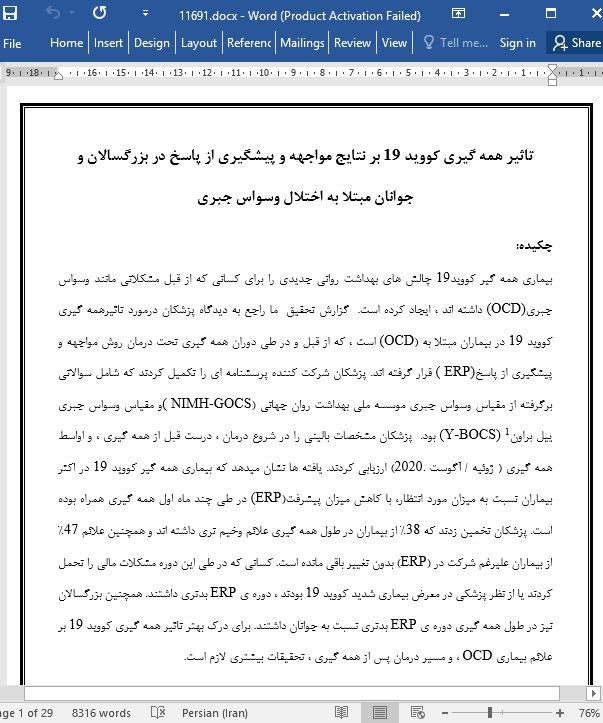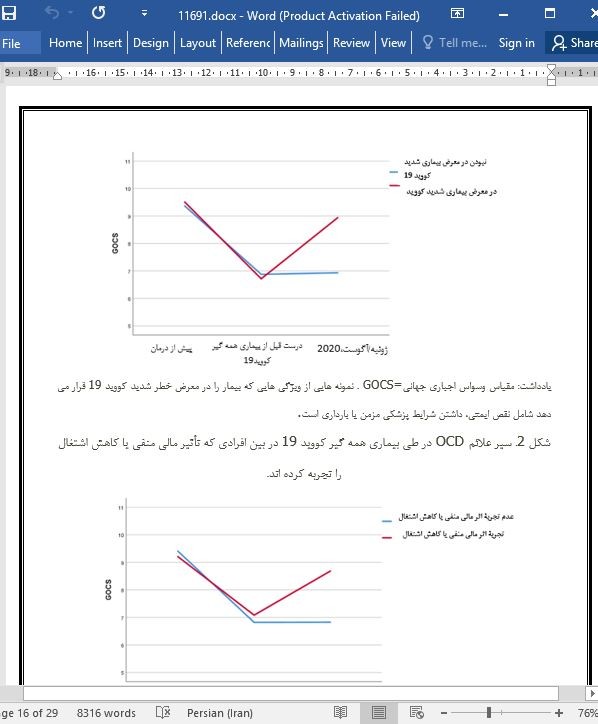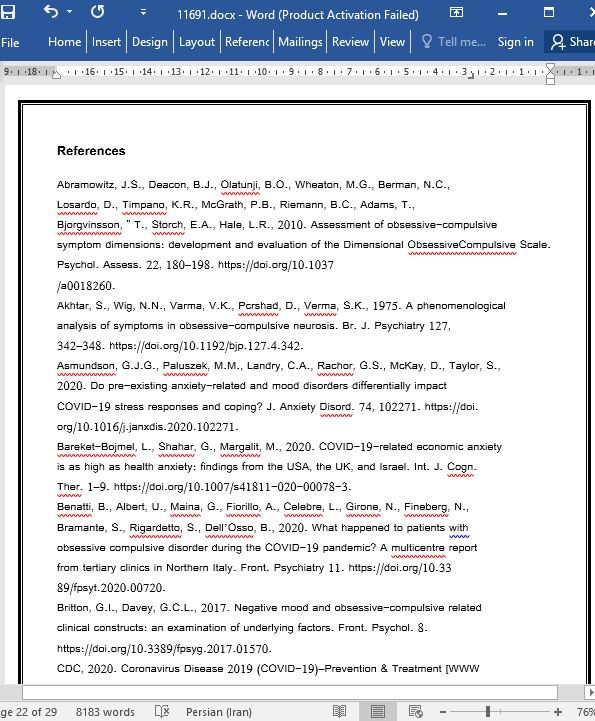
تاثیر همه گیری کووید 19 بر نتایج مواجهه و پیشگیری از پاسخ در بزرگسالان و جوانان
چکیده
بیماری همه گیر کووید19 چالش های بهداشت روانی جدیدی را برای کسانی که از قبل مشکلاتی مانند وسواس جبری(OCD) داشته اند ، ایجاد کرده است. گزارش تحقیق ما راجع به دیدگاه پزشکان درمورد تاثیرهمه گیری کووید 19 در بیماران مبتلا به ((OCD است ، که از قبل و در طی دوران همه گیری تحت درمان روش مواجهه و پیشگیری از پاسخERP) (قرار گرفته اند. پزشکان شرکت کننده پرسشنامه ای را تکمیل کردند که شامل سوالاتی برگرفته از مقیاس وسواس جبری موسسه ملی بهداشت روان جهانی (NIMH-GOCS (و مقیاس وسواس جبری ییل براون (Y-BOCS) بود. پزشکان مشخصات بالینی را در شروع درمان ، درست قبل از همه گیری ، و اواسط همه گیری ( ژوئیه / آگوست .2020) ارزیابی کردند. یافته ها نشان میدهد که بیماری همه گیر کووید 19 در اکثر بیماران نسبت به میزان مورد انتظار، با کاهش میزان پیشرفت((ERP در طی چند ماه اول همه گیری همراه بوده است. پزشکان تخمین زدند که 38% از بیماران در طول همه گیری علائم وخیم تری داشته اند و همچنین علائم 47% از بیماران علیرغم شرکت در (ERP) بدون تغییر باقی مانده است. کسانی که در طی این دوره مشکلات مالی را تحمل کردند یا از نظر پزشکی در معرض بیماری شدید کووید 19 بودند ، دوره ی ERP بدتری داشتند. همچنین بزرگسالان نیز در طول همه گیری دوره ی ERP بدتری نسبت به جوانان داشتند. برای درک بهتر تاثیر همه گیری کووید 19 بر علائم بیماری OCD ، و مسیر درمان پس از همه گیری ، تحقیقات بیشتری لازم است.
مقدمه
کروناویروس نوظهور SARS-COV-2( و سندرم بالینی آن . کووید 19) از زمان پیدایش یعنی در دسامبر 2019 پیامد های ماندگار اجتماعی، پزشکی و روانی ایجاد کرده است . افراد با رعایت دستورالعمل های ایمنی رسمی ارائه شده توسط نهادهای بهداشت عمومی و دولتی ، اقداماتی برای محافظت از خود انجام داده اند. این دستورالعمل ها شامل رعایت فاصله اجتماعی ، استفاده از ماسک صورت ، رعایت بهداشت مناسب و حفظ سایر رفتارهای پیشگیرانه است. افزون بر بیماری های پزشکی ، همه گیری کووید 19 چالش های دیگری را برای سلامت روانی ارائه میدهد. این همه گیری با بدتر شدن سلامت روانی برای افرادی که از قبل مشکلاتی داشته اند، همراه است و همچنین باعث ایجاد نگرانی های جدید درباره ی سلامت روانی میشود.
4. مباحثه
ما گزارش خود را براساس درک پزشکان از تاثیر همه گیری کووید 19 در افراد مبتلا به OCD که قبل و در طی همه گیری تحت درمان ERP بودند، ارائه می دهیم . به طور کلی ، پزشکان تخمین زدند که بیش از یک سوم از علائم بیماران آنها در دورۀ اولیۀ بیماری همه گیر کووید 19 با وجود ادامۀ درمان به صورت فعالانه ، بدتر شده است.
Abstract
The COVID-19 pandemic has created novel mental health challenges for those with pre-existing problems including obsessive-compulsive disorder (OCD). Our study reports on clinician perceptions regarding the effect of the COVID-19 pandemic on patients with OCD receiving exposure and response prevention treatment (ERP) prior to and during the pandemic. Participating clinicians completed a survey which included questions adapted from National Institute of Mental Health-Global Obsessive-Compulsive Scale (NIMH-GOCS) and Yale-Brown Obsessive-Compulsive Scale (Y-BOCS). Clinicians rated clinical features at treatment initiation, just prior to the pandemic, and mid-pandemic (July/August, 2020). Findings suggest that the COVID-19 pandemic was associated with attenuation of ERP progress from expected rates in most patients during first several months of the pandemic; clinicians estimated that 38% of their patients had symptoms worsen during the pandemic and 47% estimated that symptoms remained unchanged despite participating in ERP. Those who endured financial distress or were medically at-risk for severe COVID-19 disease had worse ERP course. Adults also had a worse ERP course during than pandemic than youth. Further research is needed to better understand the effect of the COVID-19 pandemic on OCD symptomatology and treatment trajectory post-pandemic.
1. Introduction
The novel SARS-CoV-2 coronavirus (and its clinical syndrome, COVID-19) has created lasting social, medical, and psychological consequences since its emergence in December 2019 (Lu et al., 2020). Individuals have taken measures to protect themselves by adhering to official safety guidelines outlined by governmental and public health bodies, which include social distancing, wearing face masks, practicing appropriate hygiene, and maintaining other preventative behaviors (CDC, 2020). Beyond its medical morbidities, the COVID-19 pandemic presents additional challenges for mental health. The pandemic has been associated with worsened mental health for those with pre-existing problems as well as new-onset mental health concerns (Asmundson et al., 2020; Haider et al., 2020; Plunkett et al., 2020).
4. Discussion
We report on clinician perceptions of the impact of the COVID-19 pandemic on individuals with OCD receiving ERP prior to and during the pandemic. Overall, clinicians estimated that over one-third of their patients’ symptoms worsened during the initial period of the COVID-19 pandemic despite continuing in active treatment.
چکیده
1. مقدمه
2. روش ها
1. 2. شرکت کنندگان
2 .2. مقیاس ها
3. 2 . تحلیل آماری
3. نتایج
3.1. اطلاعات شرکت کنندگان
.3. 2 تغییر در شدت OCD
3. 3. پیش بینی کننده های مسیر OCD در طی همه گیری
4. مباحثه
Abstract
1. Introduction
2. Methods
2.1. Participants
2.2. Measures
2.3. Statistical analysis
3. Results
3.1. Participant information
3.2. Change in OCD severity
3.3. Predictors of OCD trajectory during the pandemic
4. Discussion
- اصل مقاله انگلیسی با فرمت ورد (word) با قابلیت ویرایش
- ترجمه فارسی مقاله با فرمت ورد (word) با قابلیت ویرایش، بدون آرم سایت ای ترجمه
- ترجمه فارسی مقاله با فرمت pdf، بدون آرم سایت ای ترجمه



